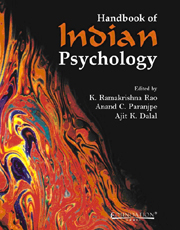Book contents
- Frontmatter
- Contents
- Contributing Authors
- Preface
- 01 Prologue: Introducing Indian Psychology
- 02 Indian Thought and Tradition: A Psychohistorical Perspective
- PART I SYSTEMS AND SCHOOLS
- PART II TOPICS AND THEMES
- 16 Indian Theories of Perception: An Inter-School Dialogue from Buddhist Perspective
- 17 Indian Psychology of Motivation
- 18 Personality in Indian Psychology
- 19 “Giving” as a Theme in the Indian Psychology of Values
- 20 The Making of a Creative Poet: Insights from Indian Aestheticians
- 21 Anchoring Cognition, Emotion and Behaviour in Desire: A Model from the Bhagavad-Gītā
- 22 Consciousness
- 23 J. Krishnamurti: Freedom from Knowledge
- PART III APPLICATIONS AND IMPLICATIONS
- Pronunciation and Transliteration of Sanskrit Alphabet
- Glossary
- Index
16 - Indian Theories of Perception: An Inter-School Dialogue from Buddhist Perspective
from PART II - TOPICS AND THEMES
Published online by Cambridge University Press: 26 October 2011
- Frontmatter
- Contents
- Contributing Authors
- Preface
- 01 Prologue: Introducing Indian Psychology
- 02 Indian Thought and Tradition: A Psychohistorical Perspective
- PART I SYSTEMS AND SCHOOLS
- PART II TOPICS AND THEMES
- 16 Indian Theories of Perception: An Inter-School Dialogue from Buddhist Perspective
- 17 Indian Psychology of Motivation
- 18 Personality in Indian Psychology
- 19 “Giving” as a Theme in the Indian Psychology of Values
- 20 The Making of a Creative Poet: Insights from Indian Aestheticians
- 21 Anchoring Cognition, Emotion and Behaviour in Desire: A Model from the Bhagavad-Gītā
- 22 Consciousness
- 23 J. Krishnamurti: Freedom from Knowledge
- PART III APPLICATIONS AND IMPLICATIONS
- Pronunciation and Transliteration of Sanskrit Alphabet
- Glossary
- Index
Summary
Perceptual cognition has been a basic and important factor in human life, in fact for all life in general. It may be regarded as pivotal to mental functions and physical behaviour of human beings and its central and pervasive role needs no special mention.
The claim of primacy and significance of perception as a foundational mode of knowing can hardly be a matter of dispute and disagreement as all other modes of knowing like inference seem to originate in perception and find their ultimate validation in perception. It cannot be denied that all cognitive processes in the empirical sphere begin with perception but there may be difference of opinion whether they end up in perception.
There can again be no unanimity in regarding empirical perception as the sole variety of perception. In spiritual, mystical, religious and some schools of moral thinking, there has been an acceptance of trans-empirical perception. In fact, there have been claims that this alone is genuine and truly veracious perception. However, as a worldly being, our main concern is with empirical perception, which may be the subject matter of our deliberations, though some references to the trans-empirical may not be ruled out. Without denying the validity of trans-empirical perceptions that are intuitive realizations of a higher type available only to realized souls, it must be pointed out that they are beyond the ken of our thought and language. They are to be experienced and not to be analysed or deliberated upon.
The role of perception in cognizing the reality has always been regarded as inevitable and valuable. Through perception alone the reality is said to be directly apprehended.
- Type
- Chapter
- Information
- Handbook of Indian Psychology , pp. 313 - 335Publisher: Foundation BooksPrint publication year: 2008

